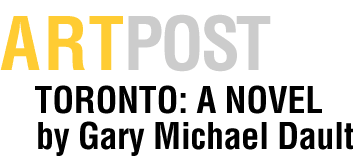TORONTO: A NOVEL: Chapter 56
Coal decided to call Linc before Bliss Carmen turned up to reclaim her dog Fish. He answered the phone, but he was way out at the beaches. Coal could hardly hear him over the wind whistling off the lake.
“What’s the shoot?” she asked him.
“Mens’ Windbreakers!” he shouted into the phone. “Lacoste, Fred Perry, Adidas, nothing special.”
“When will you be back?”
“Three, four hours,” Linc told her. “Another two hours here, and an hour trying to buck the traffic home. Why?”
“You remember that Bliss Carmen character? The one who owns Fish?”
“Hard to forget,” bellowed Linc over the tumult of the onshore breezes. “I hope she’s taking Fish home with her?”
“Apparently she is. I’m actually more concerned though about her role in those murder threats the Mayor was getting. It was her lunatic boyfriend that painted them, remember?”
“You think she’s dangerous?”
“Well, I don’t know” said Coal. “I’m pretty anxious about her coming here.”
“I’ll be there as soon as I can,” Linc told her and hung up.
Half an hour later the intercom buzzed.
“What kind of a dumb, pansified place is this anyhow?” roared Bliss into the speaker. “Mr. prettyboy Security guard here seems to think I’m some kind of goddam intruder or something.”
“Let me speak to him,” said Coal quietly. When he came on, Coal explained the situation as well as she could, knowing Bliss was standing right there listening to every word. There was a authoritative buzz and decisive click and then an oppressive silence which stretched out like cloud cover over what Coal knew was Bliss’s progress to the elevator and her silent ascension up to Coal’s penthouse. A minute or two later there was a thundering knock on the door.
“Open up in there!” Bliss bellowed. “I’ve come for my dog!”
“Why hello,” said Coal to Bliss’s enormous bulk that took up most of the doorway and blocked out the light. “She’s like a cloud bank,” thought Coal, “or something more immovable—like a concrete wall. “Please come in,” she said to the wall, quickly standing to one side so that Bliss, moving slowly and ponderously, could attain the hallway. Bliss took a dyspeptic look around.
“It’s like a damned Ikea store in here,” she announced—a remark that puzzled Coal, whose tastes ran more to chairs by Mies van der Rohe and Alvaar Alto than to democratic objects bearing names like “Hendriksdal” and “Nils.”
“We like it,” Coal murmured.
“Who’s we?’ asked Bliss.
“My partner, Lincoln Ford,” said Coal. “He’s a photographer. I’m actually expecting him any minute,” she added—with what she recognized as undue nervousness.
“Where’s Fish?” bellowed Bliss, suddenly spinning around and narrowly missing an Alvaar Alto vase on the side table. “You still got him, I hope?”
“Oh yes,” Coal assured her. He’s been well cared for.”
“Probably too well,” sneered Bliss, turning an incendiary glance upon the stuffed bookshelves and the Corbusier sofa in the living room.
“Ever give him candy bars?” Bliss asked Coal accusingly.
“Dear me, no! They can’t be good for a dog surely?”
“Well that’s too bad” boomed Bliss, “cause that’s what he likes. Especially the hard ones like Skor bars and Crispy Crunch!”
“Oh,” said Coal. “Well,” she went on brightly, “I’m afraid he’s been out of luck.
“Figures,” replied Bliss, now positively annoyed at—among other annoying things—the sight of the huge Harold Klunder painting hanging on the far wall.
“What’s that?” Bliss asked Coal, pointing to what she considered an abominable maelstrom of paint that had mistakenly found its way up onto the wall. “Or that?” she asked again, pointing at Coal’s Roy Lichtenstein painting of what seemed to be a drowning girl. Coal tried to explain both paintings, fervently wishing, once she had began, that she’d never got into the whole thing.
Bliss listened with barely suppressed contempt.
“My boyfriend paints way better than these guys!” she announced.
“Does he?” asked Coal, remembering with a shudder the beautifully repulsive old master paintings Bliss’s clearly demented partner had sent to the Mayor, each one of them despoiled by aggressive red scrawls promising mayhem and murder. “What does he paint?”
“Old masters,” said Bliss, looking as if she were searching for an available spittoon.
“Odd for a young painter.”
“Homer isn’t what you’d think of as young. He never was young.”
“That’s his name? Homer?”
“Homer Rubik.”
“Like the cube?”
“That’s what everybody says.” Bliss looked around the penthouse again. “So where’s Fish?”
“I’ll get him,” said Coal.
While she was gone, Bliss assessed the mighty living room. Books everywhere. She picked up a handful from a coffee table. The Real Real Thing: The Model in the Mirror of Art by Wendy Steiner. The Fashion System by Roland Barthes. How to Have Style by Isaac Mizrahi. Steve Martin’s novel, An Object of Beauty. “Bullshit,” she said out loud—just as Coal re-entered the room, leading a diffident Fish on a red leather leash.
“I beg your pardon?” asked Coal.
“I was just saying that your books are bullshit,” said Bliss.
“Kind of you.”
Coal unsnapped Fish’s leash and waited for the joyful reunion. Which didn’t come. Instead, Fish sat down on one of the highly figured carpets and looked strangely weary.
“Hey Fish!” boomed Bliss. “It’s me!!”
Fish looked away disconsolately.
“He doesn’t seem, very happy to see you,” observed Coal.
“Sure he is,” said Bliss. “Anybody can see that!”

